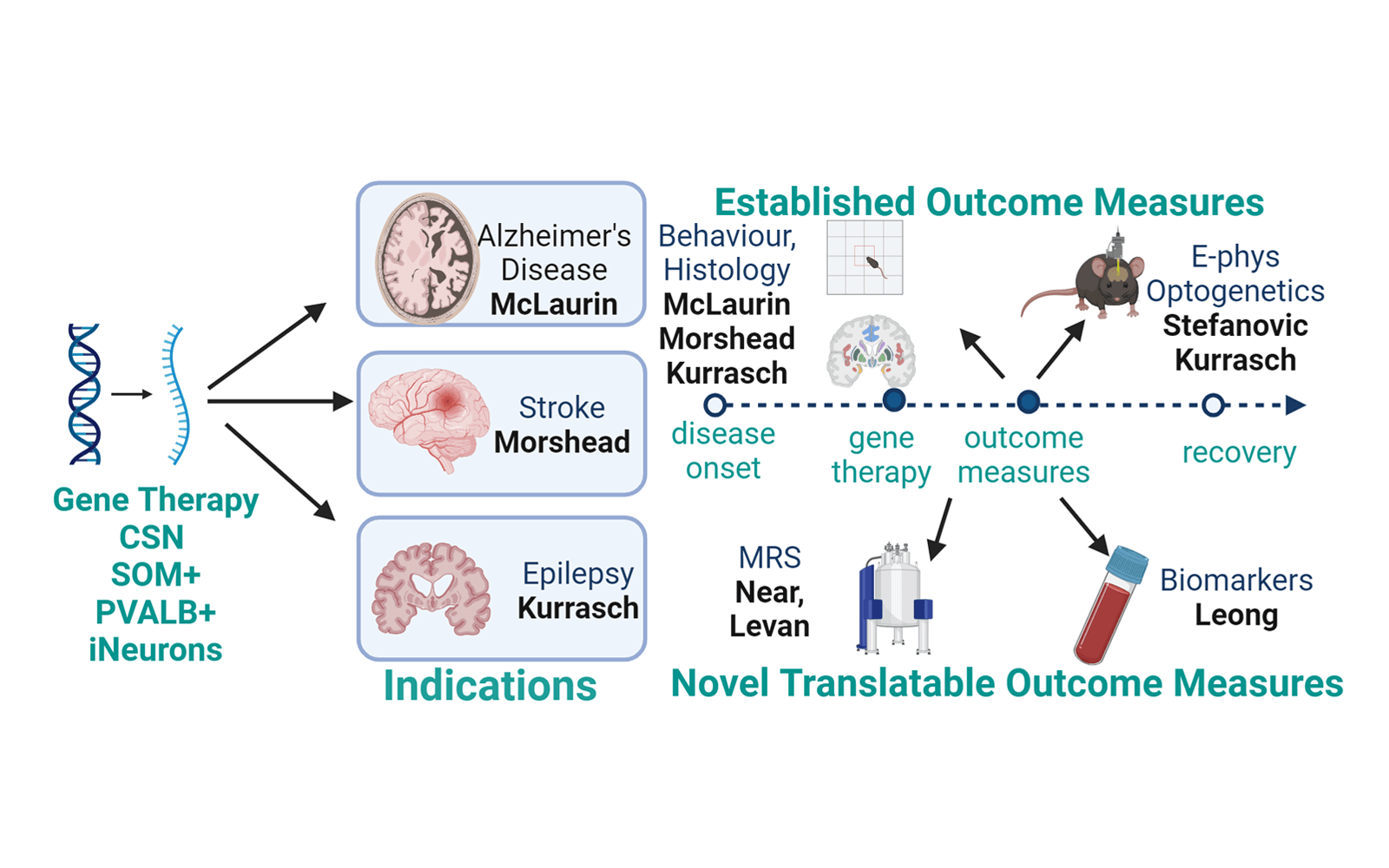
Research
Pillars
- Pillar 1: Optimizing neuronal reprogramming transcription factor (TF) cargo to make clinically relevant neuronal types
- Pillar 2: Develop astrocyte-specific delivery system(s)
- Pillar 3: Assessing outcome measures
- Cross Cutting Platform
Pillar 1: Gene Cargo
Optimizing neuronal reprogramming transcription factor (TF) cargo to make clinically relevant neuronal types.

Goal
To identify lineage-specifying TF cocktails for optimal conversion of brainastrocytes to disease-relevant excitatory or inhibitory iNeurons.

Innovation
Incorporating computational approaches is a vast improvement over small-to-medium throughput ‘trial-and-error’ studies that do not consider the full complexity of TF interactions that instruct cell identities. By iteratively combining computational approaches, empirical tests, and CRISPR genomic engineering, we will overcome barriers to iNeuron conversion.
Pillar 2: Gene Delivery
Develop astrocyte-specific delivery system(s).

Goal
To engineer tools for astrocyte-specific delivery of reprogramming TFs past the blood-brain-barrier.

Innovation
Effective and specific targeting of brain astrocytes remains elusive. We will test several delivery solutions, first with known reprogramming TFs (Ascl1, Neurod1), then with TF cocktails for specific neuronal types (from Pillar 1).
Reprogramming efficacy is impacted by length and levels of TF expression, which will differ with delivery vehicle. A priori, we do not know which TFs require longer and/or higher expression, so we test several delivery modes: (1) RNA- based delivery and smart-targeting packaging tools. (2) DNA-based bacteriophage vehicles. (3) Focused ultrasound, a clinic-ready novel technology for gene delivery.
Pillar 3: Translation
Assessing outcome measures.

Goal
To demonstrate neuronal conversion effectiveness in disease models, starting with known reprogramming TFs (Ascl1, Neurod1), and then TF cocktails specific to new neuronal types (from Pillar 1), and develop novel outcome measures.

Innovation
We will assess reprogramming efficacy using outcome measures of iNeuron integration at the cellular, network, and whole animal level. Since human neural tissue cannot be harvested for analysis, we will develop new non-invasive imaging probes and neurochemical assays.
Cross-cutting Platform

Goal
To incorporate Lived Experience, clinical considerations, and bioethical input into the technology.

Innovation
Neuronal reprogramming is a new approach, so it is important to understand potential barriers to its translation, and promote outreach. Advisory groups of persons with lived experience and clinicians, bioethics and biologists will interact to develop a “Target Value Profile” for the gene therapy that will describe and educate researchers and patient groups on expectations for outcome measures.
Team iNeuron has the special expertise of the cross-cutting platform to ensure there is a social science lens being applied to this novel research. This platform will educate researchers and patient groups about the expectations for outcome measures of this research project.
The law, governance and bioethics team, led by Dr. Ogbogu, are investigating legal, ethical and broader governance solutions for achieving inclusive innovation and downstream affordable access to neuro gene therapies and other cutting-edge regenerative medicines. There is a primary focus on how legal and ethical norms and governance can help achieve low-cost solutions and ease challenges that may impede affordable and accessible knowledge translation and technology deployment. This lens is critical for the successful technology development and market success.
The iNeuron Advisory Board for Lived Experience of Stroke, Epilepsy, and Dementia (ABLE) Group is composed of individuals from across Canada with lived experience of dementia, stroke and epilepsy, including caregivers/care partners and friends and family. Advisory Group members are provided training and ongoing support to be engaged as co-collaborators in research - not study subjects. They are meaningfully and actively involved across the iNeuron research process, including in governance, research conduct, knowledge mobilization, and priority setting. By contributing their lived experience perspectives, Advisory Group members promote better quality research with greater real-life impact for those who need it the most.
The lived experience panel includes individuals with expertise and knowledge of the conditions team iNeuron is studying. Their engagement with researchers and clinicians will foster an educational setting where materials will be developed for patients and healthcare professionals. The lived experience panel provides the team with the perspective of the patient and is a huge strength to our innovative research.




